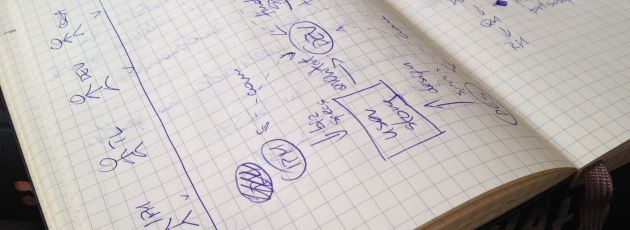I’m as paperless as it gets. Most of my documents are on Google Drive, I take notes on tablets, read only books available on Kindle and never ever print out emails (can we please drop those “consider the environment…” pledges?). I even mock my wife for leaving written task lists, instead of setting up some cards on our shared Trello board. I’m pretty much like that guy:
The benefits of my digital lifestyle are self-evident. Some of the selfish ones:
- paper has no search engine,
- paper documents are only available when I carry them with me,
- most paper books are clunkier than a Kindle.
The list goes on.
I even endure correcting the insane amount of typos I make, when writing on a touchscreen, though I’m about to put an end to this by acquiring the Microsoft Wedge Mobile Keyboard.
When someone presents me with my favorite gift - a book, I’ll still acquire it for Kindle before reading.
However… I’m a big believer in good, old paper. Turns out it’s excellent for comprehension:
[E]ven when laptops are used solely to take notes, they may still be impairing learning because their use results in shallower processing. In three studies, we found that students who took notes on laptops performed worse on conceptual questions than students who took notes longhand. We show that whereas taking more notes can be beneficial, laptop note takers’ tendency to transcribe lectures verbatim rather than processing information and reframing it in their own words is detrimental to learning. [emphasis mine]
Pam A. Mueller, Daniel M. Oppenheimer, The Pen Is Mightier Than the Keyboard, Psychological Science 2014
That might explain why I had some of my best ideas when scribbling in my Moleskine. It’s free-form. I enhance text with drawings, annotations that would take way too much time to produce on any electronic device. Ask any “creative” person and there’s a good chance he or she uses Moleskines for these very reasons.

I will always print out my travel itineraries, boarding passes, despite having them on all mobile devices I carry. The paper is there when all tech fails, because by Murphy’s laws, batteries tend to die in the least convenient moments. Last thing I want is to be stranded on some airport because I can’t present my boarding pass.
Even in the realm of books, there’s hardly anything as smartly looking as a full bookshelf. Pay attention to the more serious interviews filmed in homes or offices. More often than not, the people talking will have books behind them because these create an aura of intelligence and wisdom. When educated people visit each others’ homes for the first time they’ll often walk over to the bookshelves to inspect them. You are what you read.
And while I love Trello for all the flexibility it adds to managing my work, there’s no way it can compete with a reminder Post-it note, placed on the exit door where I am guaranteed to see it before leaving in the morning, still half-asleep.
Finally, there are important processes that I think always must remain paper-based. Government elections are a prime example. The numerous examples of voting in the past conducted electronically or online come with a rich history of controversies and failures. Anybody who builds computer systems knows they’re never fail- or hack-proof. And government elections are far too important to accept any risk that somebody could abuse the technology.
I’m sure we’re yet about to see advances in technology, that will bridge the gap between paper and digital. Kindle already imitates the look and feel of paper to deliver a superb reading experience. Meanwhile, work is underway on highly interactive computers that will look like sheets of paper:
“The future is already here - it’s just not very evenly distributed.”
For now, going 100% paperless, while possible, would not only rob me of aesthetic pleasures and limit my creativity, but also increase the risk of getting into unpleasant situations in the least expected times. I’m happy to rely on paper for much of my work and will continue doing so.